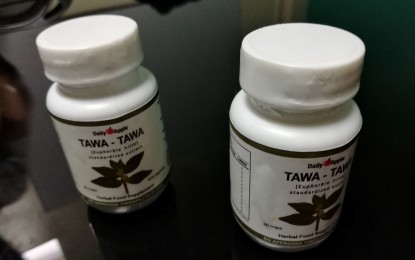
ANTI-DENGUE SUPPLEMENT. The Daily Apple tawa-tawa (Euphorbia hirta) standardized extract capsules in bottles of 30s launched on Tuesday (Aug. 21, 2019). Manufacturer Herbanext Inc. is a recipient of funding support from the Department of Science and Technology for research and development work on the tawa-tawa capsules, which ran for more than five years. (PNA photo by Nanette L. Guadalquiver)
BAGO CITY -- A Negros Occidental-based herbal food supplements manufacturer, assisted by the Department of Science and Technology (DOST), has released to the market the country’s first standardized extract of tawa-tawa plant believed to be effective against dengue virus.
Herbanext Laboratories Inc. launched the product Tawa-Tawa (Euphorbia hirta) in capsule form under the brand name Daily Apple at their plant site in this southern Negros city on Tuesday.
“I sat on our Food and Drug Administration (FDA) license for three months until I noticed that dengue cases were becoming more problematic,” said company president Philip Cruz, of his decision to commercialize the product.
With the prevalence of dengue cases in the Philippines in recent years, tawa-tawa has become popular as a medicinal plant as “folk wisdom regards it as a hemostatic, which may help explain why blood platelets increase after ingestion of a boiled decoction of the plant.”
The Daily Apple Tawa-Tawa Standardized Extract, which has been given a food supplement status by the FDA, or without approved therapeutic claims, is intended for consumers who would like to use it in a standardized dosage form instead of decoction.
The product is distributed by Generika drugstores nationwide, particularly in areas with high dengue cases, including Western Visayas.
Each 670 mg of the green capsule, packed in a bottle of 30s, contains 234 mg of tawa-tawa extract and is standardized for its content of selected flavonoids.
“It cannot harm, but potentially, it can help a lot of people. We’re hoping it will deliver what it is best intended for,” Cruz said.
Still, the manufacturer strongly advised dengue patients to seek proper hospital care to monitor platelet count and other important blood parameters since these tests are important to determine the severity of one’s infection.
Pre-clinical studies carried out by Herbanext Inc., including an acute toxicity study conducted at the Research Center for Natural and Applied Sciences of the University of Santo Tomas, showed that spray-dried tawa-tawa extract produced using the company’s proprietary process is non-toxic.
A screening conducted at the Disease Molecular Biology and Epigenetics Laboratory of University of the Philippines-Diliman also indicated the safety of tawa-tawa extract and its suitability for drug development.
Cruz said they are working with the University of San Agustin in Iloilo City for the conduct of clinical studies starting next year to identify the compounds in tawa-tawa that increase platelets and kill the virus.
Herbanext Inc. is a recipient of funding support from the DOST for research and development (R&D) work on the tawa-tawa capsules, which ran for more than five years.
It is included in the Tuklas Lunas Program of the DOST-Philippine Council for Health Research and Development (PCHRD) for the development of herbal drug to aid in the recovery of dengue patients.
To manufacture the tawa-tawa extract capsules, Cruz said Herbanext mainly sources raw materials from a group of indigenous people, the Marikudo Ati, in Isabela, Negros Occidental, who gather the plants from the wilds and sell it to them at PHP30 per kilogram.
He added that the DOST also assists them in propagating tawa-tawa plants. (PNA)
